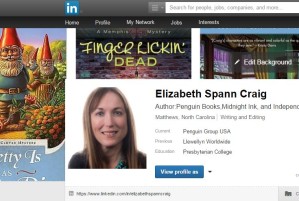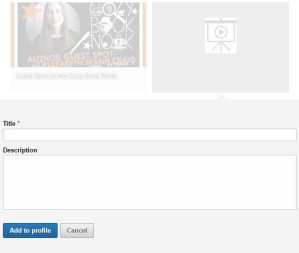by Elizabeth S. Craig, @elizabethscraig
Lately I’ve been spending time brushing up my LinkedIn profile. I wrote about my progress in March. One thing I like about this platform is that I don’t have to spend much time there. I can keep elements current and then basically leave the profile alone.
I’ve searched for tips that help optimize my page, since I’ve always been somewhat at a loss on LinkedIn. It’s not exactly a social site, but it’s not exactly a place where we upload a static resume and leave it alone.
I recently read an article by Alex Campbell on PC World: “The one LinkedIn profile tip everyone should know: Use Work Samples to show off your achievements.” The author seemed to have freelance writers in mind. But I wondered if I could adapt the tip to make it work for published books instead of articles.
Campbell explained that linking to work samples would not only give evidence of authority but would also make the page more visually appealing and interesting. That’s because it would populate our LinkedIn profile with images (most articles these days, obviously, have images at the top).
There are several areas on our profile where we can add these work samples/images: Summary, Experience, and Education. Alex Campbell recommended that we definitely include samples in our Summary section, since it was near the top of the page and would be eye-catching.
I tried a few different things, but because of the way the LinkedIn page is set up, images didn’t attach. For instance, I tried uploading a sample chapter from My Documents, but it didn’t allow me to upload a cover separately. I was just getting a text box thing on there.
I finally hit gold when I tried linking to a Kindle Preview link. As a bonus, I could add in my Amazon Affiliate ID to create the link. If you’re unfamiliar with Kindle Preview, it’s easy to set up. I detail how to do that in this January post. Basically, it’s a matter of clicking on the “embed” link under the “buy now/give as a gift” box on your book page on Amazon, and then copy-pasting the link (or adding in your ID code and copy-pasting the link, if you’re an Affiliate).
I pasted the URL in the box on the LinkedIn page. Right underneath, it gives us the opportunity to add a title and description, which I did. I hit “add to profile,” and held my breath. It worked! It added a nice visual to the page and clicking the visual takes readers to Amazon’s sample. Readers can preview without having to log into Amazon.

I thought adding all of my books was, well, probably impossible or at least would make it too crammed on the page. It might be nice, for those of us who write more than one series, for us to divide our the Experience section into series somehow and add the covers (or some of them) for each individual series. For instance, I divided my two series with Penguin by imprint (“employers”) and added covers for each. My self-published series goes under Midnight Ink, since the series started with them.
This is one of those things that really only takes a few minutes, but makes a nice difference, visually.
Any other LinkedIn tips?
A LinkedIn tip for writers: Share on X
If you view your profile on LinkedIn as others see it, you’ll notice up above your head shot and your current title/position, there’s a banner area that’s about 2.5″ thick and spans the screen of whatever monitor you’re using. You can but an image in this area.
Because I write under a pen name but I’m on LinkedIn under my real name, I’m not ‘pushing’ my fiction there, per se. I post about it or share links from time to time and it’s acknowledged in my profile but I focus more on a haunted house business my spouse and I own and operate. I used the top portion of our logo there totally changing the ‘flavor’ of a staid LinkedIn profile. Bonus; I’ve had far less people contacting me about recruiting jobs, a profession I left years ago, as a result.
As an author, you could post a graphic in that area that shows your books or even use the header that you do here. It would look amazing there.
Anne–Thanks for letting everyone know about the banner/background tip! You’re right…another important place to help us stand out.
I think LinkedIn is tricky for those who need to have a day-job professional presence and also a presence as a novelist. And I love the way you designed your banner to show your different careers. I’m interested in hearing how others effect the balance.
Thank you, I’ll have to try that. I could also add a sample of my formatting and an image link to DLP.
Diane–Exactly! Somehow I never knew about the ability to add media to those different areas. I’m not sure I could fit something like that onto the education area…but maybe if we had a video of us speaking at our alma mater? Or maybe just use the available space to upload media, regardless of the section’s focus.
Last summer I put images of my book covers in my Experience, but I hit a limit of what could go there and couldn’t figure out how to put images into other sections. Thanks for this- I’m inspired to play now.
Having left Facebook (at least my personal account) and Twitter, I’ve started spending more time on LinkedIn. The value is in targeted Groups; finding the right handful can make all the difference.
Deb–It’s a little odd to me that they limit uploads to those three areas (especially in this age of image importance), but I guess they’re trying to avoid clutter.
I’ve thought about doing Groups there, but haven’t found the time to explore!
So far these are the best I’ve found https://www.linkedin.com/groups/1515307 and https://www.linkedin.com/groups/1848415
Thanks for these, Deb!
This is a really helpful post, Elizabeth, so thanks. I’ve found that people do look at my LinkedIn profile, and I think they do want to get a sense of the kind of writer I am, the other things I do, and so on. So it makes perfect sense to put together a profile that will tell potential publishers/agents/editors/readers about your work. And as you say, it’s fairly easy to add in those things. I even have my blog posts feed directly in, as a taste of what I do.
Margot–There are more people looking at that profile than I’d have guessed. It’s definitely come into its own as a platform.
You always find some way to help me that I had not thought about. You are great. Thanks!
Roland–Thanks for coming by! Hope you have a great weekend.
Do you really find that LinkedIn is useful for writers? My LinkedIn account is mostly concerned with my day job and I’m not sure how I could add the author aspect without making it look cluttered.
Ken–I hear you. A good and thoughtful question. I’ve been wondering how authors who have a career besides writing manage the balance.
I’ve noticed LinkedIn work in my favor in several different ways…one that people who are locally acquainted with me can learn I’m a writer (this tends to make the curious purchase at least one book). Another benefit is that I’ve picked up a local speaking engagement or two (as a writer) through LinkedIn. Third, that linking to my website from LinkedIn (an authoritative site), helps increase the SEO for my site and make me a bit more discoverable.
BUT! I’d say that if a writer wasn’t looking for these particular advantages (not everyone wants to speak, not everyone wants to have their random neighbors know about their writing, etc), their time would be better spent in other marketing activities or in keeping their LinkedIn profile related to their day job.
Good idea about the link to kindle preview. My books are print, so perhaps I can link to my blurb.com bookstore instead.
Martha–Hope it works for you!
Hi Elizabeth – good to know about and to read Anne Hagen’s ideas … and the others too – cheers and as Roland says always helpful .. Hilary
Hilary—Some interesting stuff there, for sure. Thanks so much for coming by and hope you have a happy week!